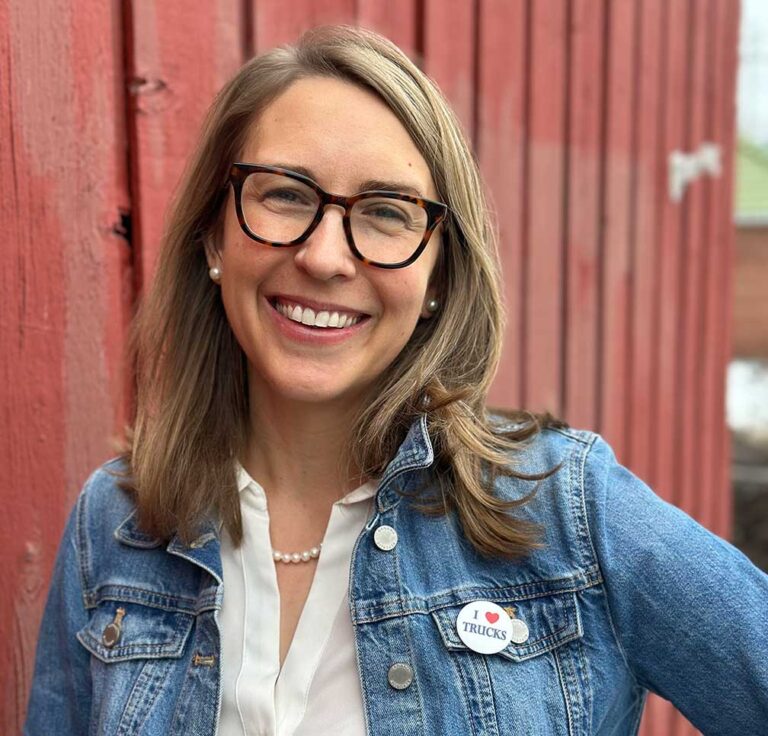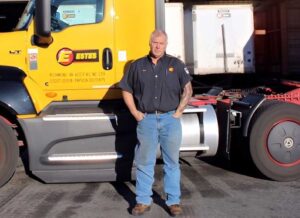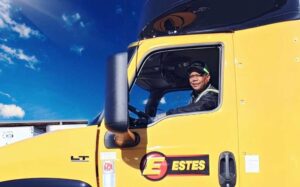In some ways, U.S. Rep. Hillary J. Scholten (D-MI) is the exact opposite of a legislator you’d expect to champion the trucking industry. Her peerage as a Department of Justice attorney and first-term Democrat don’t exactly align with the blue-collar, working-class, and generally conservative trucking industry.
In all the ways that count, however, Scholten is exactly the type of ally the industry needs most on Capitol Hill.
Describing herself as an advocate for her constituents — many of whom make their living behind the wheel and under the hood — the plain-spoken representative told Truckload Authority that she’s translated her affinity for trucking in her home state to a wider national agenda.
“Michigan put the world on wheels, and we are continuing to move it forward,” she said. “A large part of that is not only the invention and manufacturing of the automobile itself, but the trucking industry.
“We have a lot of trucking in my district,” she continued. “We’ve got trucking across the state that not only moves those great auto parts across the country, but so many other goods as well. You can’t grow up in a place like Michigan and not be exposed to the trucking industry.”
Scholten says her understanding of the importance of transportation and infrastructure issues is what led her to seek a seat on the House Transportation and Infrastructure Committee. That role led to an appearance as a speaker during the Truckload Carriers Association’s Call on Washington last fall, where she brought down the house.
“There are major issues facing the trucking industry right now, from lack of available parking spaces to driver-aided technology, autonomous vehicle technology, that is developing without the appropriate oversight from Congress,” she said. “These are nonpartisan issues that require bipartisan solutions — for people to work together. From my perspective, even though I’m a Democrat, these are not issues that only face Democrats.
“We don’t have people coming together to talk about the issues as much as we should in this country,” she said. “Far too often, we see people retreat to their various corners instead of coming together to just make government work for people and industries.”
In short, what’s needed is the ability to see past party lines for the betterment of the industry.
“That is what we need more of in Washington,” she said. “Our truckers are counting on it, people are counting on it, and the future and safety of the trucking industry is dependent on it.”
A look at Scholten’s background suggests she’s not unfamiliar with standing apart from the norm. The first woman and mother ever to represent Michigan’s Third District in Congress, she says one of the toughest debates she ever faced was in her own household over her party affiliation.
“I was not born and raised in a Democratic household. I think one of the things that really resonated with people is my ability to connect with people on both sides of the aisle,” she said.
“It’s not just a talking point or something that I feel like I have to do for political reasons. It’s personal,” she continued. “I had to have a very real come-to-Jesus talk with my father when I chose to run as a Democrat.”
Since arriving on Capitol Hill, Scholten has pushed legislation on behalf of the trucking industry — only to discover, like many before her, how leaden the wheels of lawmaking can be.
“We passed HR 2367, the Truck Parking Improvement Act, out of the T&I Committee, (which is) overwhelmingly bipartisan,” she said. “But when it comes to the larger House, the House has refused to take it up for a vote.”
She believes that if the bill could be put on suspension — a mechanism where a bill doesn’t go through for amendments that can often politicize a bipartisan bill and requires a two-thirds vote to pass — it would pass.
“But they’re not bringing it to the floor,” she said. “Instead, we’re having impeachment hearings and voting on whether to impeach or censure a political rival. Both sides are doing that — Democrats and Republicans.”
Asked if such situations come as a result of ignorance on the part of fellow lawmakers about the importance of the trucking industry, Scholten didn’t go that far.
“One of the things that gives me a lot of hope is that the issues around the trucking industry — issues around transportation, more generally — are incredibly bipartisan,” she said. “I think a lot of that comes from recognizing that this is an essential issue that impacts every area of our lives.
“But what I don’t think they understand is the urgency,” she continued. “When a restaurant is waiting for their fresh vegetables every day, they don’t care how many censure resolutions Congress has brought; they care about whether the trucks can park where they need to park.”
Scholten says that while she continues to work to bring the parking bill to the light of day, she’s also delved into the problem of workforce shortages.
“One of the very first bills that I cosponsored, a bipartisan bill with one of my fellow Republicans on T&I, Marc Molinaro, is the Honoring Vocational Education Act,” she said. “The bill changes the way the United States Census tracks higher education. Currently, you can only check that box if you are getting a four-year college degree.”
Currently, she says, the Census Bureau has no category under educational attainment for apprenticeships, technical certifications, and other skilled trades. Scholten wants to change that.
“The more we continue to track and understand the wonderful benefits of this type of education in our community, I think we start to change the culture around that and get folks to consider all of the benefits of a career in industry, like trucking,” she said.
Above all else, Scholten said, she wants bipartisan cooperation to help move such solutions through the legislative process as quickly as possible.
“I think the way we push past a lot of the dysfunction is by being a part of the solution ourselves,” she explained. “It’s far too easy to throw your hands up and just do an angry Tweet. It’s much harder, but much more essential that we have people willing to put all that aside and just get down to work to solve problems.”
Photo courtesy of U.S. Rep. Hillary Scholten
This article originally appeared in the March/April 2024 edition of Truckload Authority, the official publication of the Truckload Carriers Association.
Dwain Hebda is a freelance journalist, author, editor and storyteller in Little Rock, Arkansas. In addition to The Trucker, his work appears in more than 35 publications across multiple states each year. Hebda’s writing has been awarded by the Society of Professional Journalists and a Finalist in Best Of Arkansas rankings by AY Magazine. He is president of Ya!Mule Wordsmiths, which provides editorial services to publications and companies.









bring back the pay from 1980